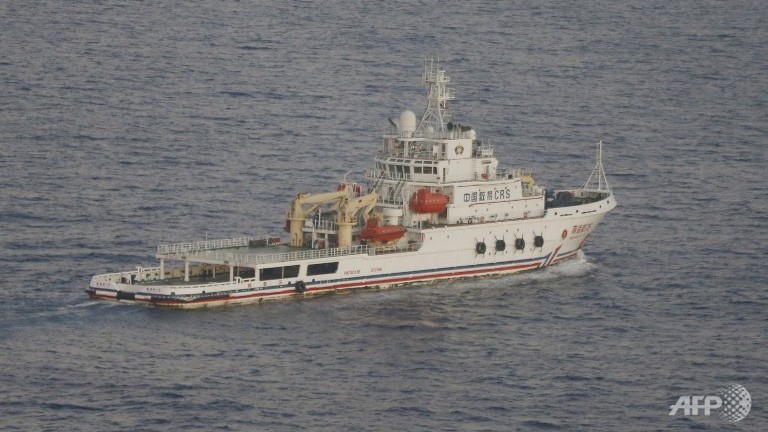MH370 search draws blank

Chinese ship Nan Hai Jiu in southern Indian Ocean on March 29, 2014. Chinese ships trawled a new area in the Indian Ocean for the missing Malaysia Airlines MH370 on March 29, as the search entered its fourth week amid a series of false dawns over sightings of debris. (AFP/POOL/Jason Reed)
PERTH, Australia: A new search area failed to yield an immediate breakthrough in the hunt for ill-fated Flight MH370 on Sunday, as Australia appointed its former military chief to help coordinate the operation in the Indian Ocean.
Debris spotted by aircraft and then picked up by ships combing the new search zone proved not to be from the Malaysian Airlines' Boeing 777, the Australian Maritime Safety Authority (AMSA) said.
"It appeared to be fishing equipment and just rubbish on the (ocean's) surface," an AMSA spokesman told AFP.
As the hunt resumed 1,850 kilometres (1,150 miles) west of Perth, Australia said former defence force chief Angus Houston would head a new unit to help in the search, which involves the militaries of seven nations -- Australia, China, Malaysia, Japan, New Zealand, South Korea and the United States.
Prime Minister Tony Abbott said that Houston would lead the new Joint Agency Coordination Centre (JACC) based in Perth, "to coordinate the Australian government's support for the search into MH370".
Houston, who was chief of the Australian Defence Force from 2005-2011, has been given a brief to coordinate the often delicate diplomatic contacts between participants in the international effort.
He will also make sure that families receive up-to-date information and travel assistance, including visa services, accommodation advice, interpreter services and counselling.
Describing Houston as "an individual of enormous experience and great skill who has already served his country with distinction," Abbott said his appointment was part of Australia's commitment to learning the fate of the flight which disappeared with 239 people on board on March 8.
"This government won't rest until we've done everything we reasonably can to get those families and to get the wider community of the world a little more peace and a little more insight into exactly what happened," he said.
International protocols mean Malaysia is officially in charge of the search operation, but Abbott made clear that Houston was available "to oversee the overall search and investigation effort" if asked.
"Should our (Australia's) responsibilities increase as time goes by, there is no one better placed than Angus to coordinate and liaise, given the quite significant number of countries that all have a stake here," Abbott told reporters.
Authorities continued to pour resources into the operation, which is scouring an area about the size of Norway, dispatching an Australian navy ship with a US-supplied "black box" locator on board.
AMSA said four ships, three of them from China, were already in the search zone and another six were scheduled to arrive later Sunday.
The Australian authority also has 13 military planes at its disposal, including two Malaysian C-130 Hercules which joined the operation for the first time Sunday, while the frigate HMAS Toowoomba is also on the way.
All efforts to locate the plane have so far proved fruitless, with hopes repeatedly raised by debris sightings, including more than 70 items seen by a New Zealand Orion on Saturday that turned out to be random flotsam.
"Until items are picked up by a ship and assessed by expert investigators, no conclusions as to their origin can be made," New Zealand's Air Vice-Marshal Kevin Short said.
"It's difficult and demanding work, scanning the ocean for small items, even flying low over the water at comparatively slow speeds. It requires total concentration."
The search moved on Friday to a new sea zone after fresh data indicated the plane was flying faster than first thought before it is presumed to have run out of fuel and plunged into the sea.
But debris sightings by Chinese, Australian and New Zealand planes on Saturday did not yield any solid clues in one of aviation's greatest mysteries, compounding the frustration of families who have been waiting more than three weeks to discover the fate of their loved ones.
Many of the relatives have been critical of Malaysia's handling of the crisis, accusing it of not being transparent.
Families of the 153 Chinese passengers -- two-thirds of those on board the plane -- have been particularly vocal, with many refusing to accept Malaysia's view that it crashed into the sea after being deliberately redirected by someone on board then flown thousands of miles southwards.
What the stars mean:
★ Poor ★ ★ Promising ★★★ Good ★★★★ Very good ★★★★★ Exceptional
Latest News
More News
- Russian President congratulates Vietnamese Party leader during phone talks (January 25, 2026 | 09:58)
- Worldwide congratulations underscore confidence in Vietnam’s 14th Party Congress (January 23, 2026 | 09:02)
- Political parties, organisations, int’l friends send congratulations to 14th National Party Congress (January 22, 2026 | 09:33)
- 14th National Party Congress: Japanese media highlight Vietnam’s growth targets (January 21, 2026 | 09:46)
- 14th National Party Congress: Driving force for Vietnam to continue renewal, innovation, breakthroughs (January 21, 2026 | 09:42)
- Vietnam remains spiritual support for progressive forces: Colombian party leader (January 21, 2026 | 08:00)
- Int'l media provides large coverage of 14th National Party Congress's first working day (January 20, 2026 | 09:09)
- Vietnamese firms win top honours at ASEAN Digital Awards (January 16, 2026 | 16:45)
- ASEAN Digital Ministers' Meeting opens in Hanoi (January 15, 2026 | 15:33)
- ASEAN economies move up the global chip value chain (December 09, 2025 | 13:32)
















 Mobile Version
Mobile Version